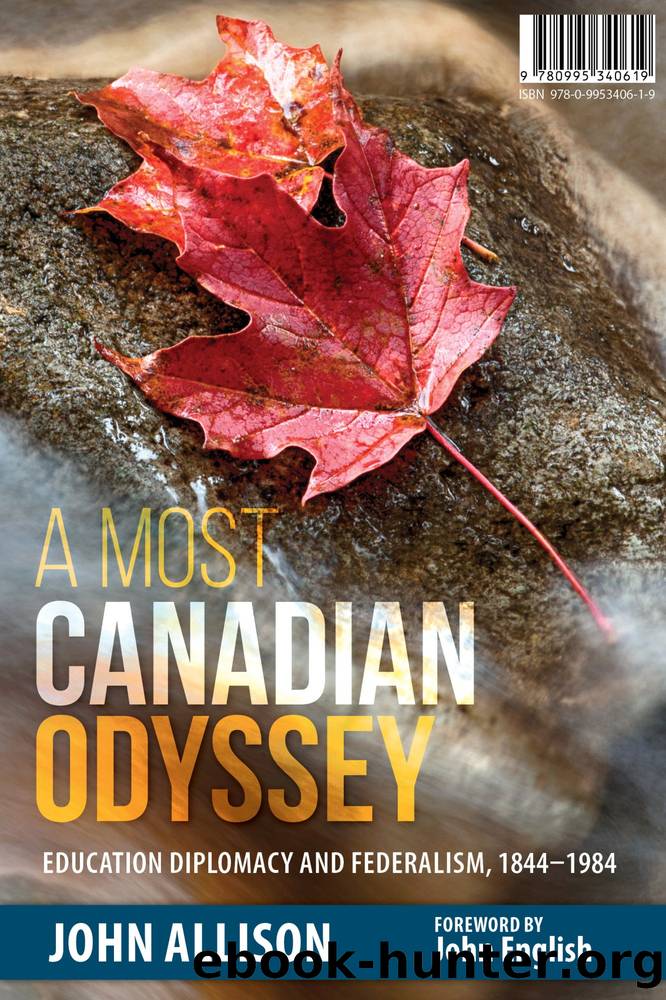A Most Canadian Odyssey: Education Diplomacy and Federalism, 1844-1984 by John Allison

Author:John Allison [Allison, John]
Language: eng
Format: epub
Tags: International Relations, Political Science, Diplomacy
ISBN: 9780995340626
Google: 2dE3MQAACAAJ
Goodreads: 33597170
Publisher: Dr. John Allison
Published: 2016-01-15T11:18:29+00:00
Chapter Six
The CMEC, Federalism, and
âthe Ottawa Wayâ in Education, 1970â19841
The 1970sâFinding Ways to Communicate
While the shifting international scene profoundly altered the environment for Canadian education diplomacy, at the level of implementation the 1970s and early 1980s were marked by communications challenges, accords, and compromises. This chapter returns to the examination of post-1968 education diplomacy as an evolving and convoluted part of Canadian foreign policy. In part, the challenges were institutional. The emergence of the CMEC and its evolution from a committee of the CEA to a larger separate organization with its own secretariat contributed to the contingent nature of the relationship between federal and provincial authorities in the field of education diplomacy. Accommodating the growing pains of this new agency led to circumstantial agreements on a wide range of educational issues, including education diplomacy. Self-definition remained an important matter for the CMEC during most of this period.
Moreover, the integration of the Council of Ministers into the wider context of Canadian federalism retarded the regularization of education diplomacy. Throughout the 1970s, and more recently, the emergence of numerous new agencies had a profound effect on the day-to-day operation of federalism in Canada.2 Examples include the CMEC, of course, but also the Canadian Council of Ministers of the Environment, the Health Council of Canada, and the ProvincialâTerritorial Council of Ministers of Securities Regulation. High-level politicians and administrators, despite their resistance to change, benefited from the ongoing revolution in air travel and telecommunications, which made it possible to bring previously isolated provincial and federal elites closer together, thus invigorating and altering the dynamics of the federal-provincial relationship.3
Continued federal involvement in education at the international level, however, did not ease the conflict between the two levels of government. Federal attention became more intense as internationalization affected economic systems and governments around the world.4 Nationalism and Canadian unity were the forces behind the federal governmentâs interest in education diplomacy, both in matters of strategic importance and in the minutiae of policy.5 In an era of increasingly close alignment among events, news, and response time, the federal government saw that it was in its best interest to ensure that its transitory envoys (i.e., ministers and bureaucrats) briefed its traditional envoysâthe ambassadors and consuls who served in âlineâ positions in Canadian embassies in foreign countries.
During the CMECâs first fifteen years, the evolution of its organization and mission contributed greatly to the provisional character of its relationship with the federal government in educational diplomacy. The organizationâs search for a role at both the national and international levels during this period permeated the ad hoc collaboration between the provincial and federal governments. Repeated attempts to establish a place for itself in Canadian international relations were concurrent with the organizationâs evolving view of its capacities in this domain. The possibilities were myriad. Full control and monitoring of international education activitiesâ effectively taking on the role of a national ministry of educationâwould potentially involve the responsibilities of sixty federal agencies6 and include international educational activities in everything from CIDA to the Ministry of Labour.
Download
This site does not store any files on its server. We only index and link to content provided by other sites. Please contact the content providers to delete copyright contents if any and email us, we'll remove relevant links or contents immediately.
| Anthropology | Archaeology |
| Philosophy | Politics & Government |
| Social Sciences | Sociology |
| Women's Studies |
The Secret History by Donna Tartt(19053)
The Social Justice Warrior Handbook by Lisa De Pasquale(12187)
Thirteen Reasons Why by Jay Asher(8893)
This Is How You Lose Her by Junot Diaz(6877)
Weapons of Math Destruction by Cathy O'Neil(6265)
Zero to One by Peter Thiel(5787)
Beartown by Fredrik Backman(5737)
The Myth of the Strong Leader by Archie Brown(5500)
The Fire Next Time by James Baldwin(5431)
How Democracies Die by Steven Levitsky & Daniel Ziblatt(5215)
Promise Me, Dad by Joe Biden(5141)
Stone's Rules by Roger Stone(5081)
A Higher Loyalty: Truth, Lies, and Leadership by James Comey(4954)
100 Deadly Skills by Clint Emerson(4921)
Rise and Kill First by Ronen Bergman(4780)
Secrecy World by Jake Bernstein(4741)
The David Icke Guide to the Global Conspiracy (and how to end it) by David Icke(4709)
The Farm by Tom Rob Smith(4502)
The Doomsday Machine by Daniel Ellsberg(4484)
